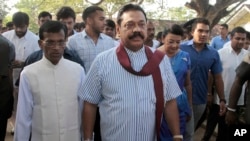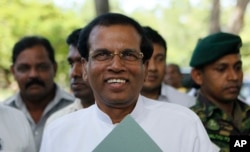Sri Lankan President Mahinda Rajapaksa, seeking a third term in Thursday’s elections, is facing an unexpected and powerful challenge from one of his former aides.
When he called the election two years ahead of schedule, the island nation’s leader was expected to cruise to an easy victory. But an internal revolt led by Maithripala Sirisena, his former health minister in the ruling Freedom Party, has seen more than 20 lawmakers and former ministers cross over from the president’s side to his rival.
The rival United National Party and parties representing ethnic minorities also have thrown their support to Sirisena.
The broad political support has energized the opposition campaign, said National Peace Council Director Jehan Perera. He said Rajapaksa faces “formidable opposition, consisting of the main Tamil party, the main Muslim party, the main opposition Sinhala party as well as a section of his own party. And there are many analysts who see the president in fact as the underdog.”
Benefits from war’s end
Rajapaksa’s popularity soared after he ended a long-running civil war with Tamil rebels and he was easily reelected in 2010.
He has won praise for rebuilding the economy, but critics accuse him of autocratic rule. He has handed key positions to his brothers: One heads the economy ministry, one is speaker of parliament and one is defense chief.
Sirisena accuses the president of allowing his family to capture the country’s economy, wealth and administration.
Many voters agree, said Paikiasothy Saravanamuttu, executive director of the Center for Policy Alternatives in Colombo. “I think it is the feeling in the country that there has been a fair amount of corruption, that a lot of state resources and financial deals have involved the ruling family with a lack of transparency,” he said. “The cost of living has gone up quite a bit and that has really caused disenchantment.”
Campaign for growth
Rajapaksa, 69, is campaigning on economic growth and stability, saying there is a conspiracy to destabilize the nation. Expressing optimism, he said he hopes his core constituency, the Sinhala Buddhist majority, will catapult him back to power.
But Sirisena represents the same Sinhala constituency, and he also hopes to get the votes of Tamil and Muslim minorities. They account for about 30 percent of the population.
Muslims are angry about a series of attacks mounted by extremist Buddhist monks. Tamils say they continue to be marginalized, while little has been done to punish those responsible for war crimes.
Perara said the minorities are deeply disillusioned with the president.
"After he won the elections, there was a hope he would reach out to minorities, he would unify the country," Perara said. "But instead, President Rajapaksa continued to focus on the Sinhala voter base.
"He and his government continued to say there remains a threat from the international community, from the remnants of the LTTE," Perara said, referring to the Liberation Tigers of Tamil Eelam. "They did not reduce the size of the military. They centralized power instead of sharing it with the ethnic minorities."
Sirisena promises to curb the enormous powers Rajapaksa has gathered for the presidency, which some say the latter has done by undermining the judiciary’s independence.
Close vote expected
There are no credible polls, but most analysts expect the election to be close.
Political observer Saravanamuttu said this election will also be one of the most significant the country has witnessed in recent decades.
The big question, he said, is whether voters “are willing to go with [an] autocratic, dynastic project or whether they are much more in favor of returning to parliamentary democracy.”
The campaign, which ended Monday, has been marred by sporadic reports of violence on opposition rallies by pro-government mobs and of bribery to win votes. The government has denied such reports.








